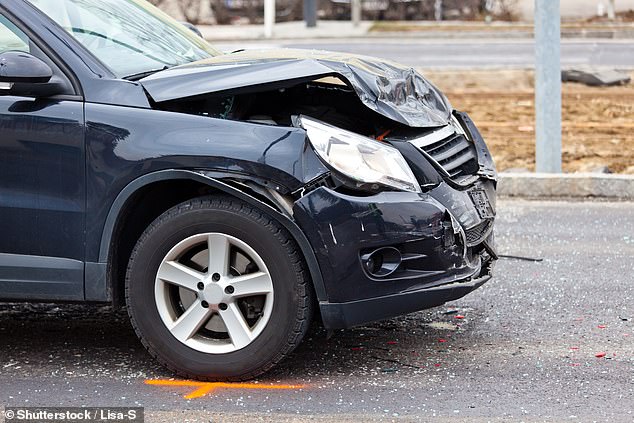Table of Contents
- People who suffer whiplash or other injuries receive better compensation
- This move will also clear a backlog of thousands of pending cases
- But insurers say the decision means car insurance premiums could rise further
<!–
<!–
<!– <!–
<!–
<!–
<!–
People injured in car accidents will get faster and bigger payouts after insurers lost a major lawsuit over how to compensate claimants.
The Supreme Court’s ruling also means that a backlog of thousands of cases can now be dealt with freely.
But the decision could mean higher car insurance premiums, or at least no drop in prices – with them already averaging £543 by 2023.
Here you will find everything you need to know about how the decision will affect your accident compensation.

Crash test: The insurers’ appeal was heard in Britain’s highest court, the Supreme Court
What does the Supreme Court’s ruling mean for me?
The Supreme Court said this week that so-called ‘mixed injuries’ from car accidents – that is, whiplash and another condition such as wrist or hip damage – should be liable for two separate payments from insurers, adjusted downwards if there is any overlap.
In practice, this means higher total compensation for drivers who have been injured in multiple ways.
If the insurers had won, the non-whiplash portion of any damages would have been capped as is now the case for whiplash.
What is the limit for whiplash claims?
Since 2021, whiplash claim payouts have been limited to a flat rate starting at £240, with only the most serious cases exceeding £5,000.
The rate was introduced as part of reforms introduced at the insurers’ trade body, the Association of British Insurers (ABI), in response to what it saw as an epidemic of false and expensive whiplash claims.
The reforms also brought in an official personal injury claims portal, which was intended to speed up whiplash compensation payouts and reduce the need for claimants to rely on lawyers – although most still do.
Why are mixed personal injury claims in the spotlight?
The whiplash reforms did not cover payments for other types of injuries. With whiplash payouts severely reduced, injured drivers began claiming other conditions that they might not have suffered when neck injury payouts were higher.
This posed a problem for insurers because payouts for non-whiplash injuries were not capped and could therefore be higher.

In January 2023, the Court of Appeal dismissed insurers’ appeals in two test cases, Briggs and Rabot, meaning people with mixed injuries could claim full compensation for non-whiplash injuries and a cap on payments for whiplash.
The ABI went to the High Court to appeal this decision, but lost. The trade association had argued that insurers would ultimately have to pay higher claims for ‘double counting of injuries’.
An ABI spokesperson said: ‘We are disappointed by the High Court’s decision to uphold the Court of Appeal’s judgment on the mixed injury test case. In the interest of clarity for both plaintiffs and defendants, we have supported these test cases.”
Stuart Hanley, head of the legal practice at Minster Law, said insurers may have already factored the High Court loss into their premium prices.
Hanley said: ‘Given the way the Court of Appeal decision was made, you would imagine insurers have already factored this into their prices.’
But insurers may be able to reduce premiums now that they have certainty from the Supreme Court’s ruling.
Matthew Maxwell Scott, executive director of the Association of Consumer Support Organisations, said: ‘It is good news that the wheels of justice have quickly been set in motion here.
‘With the ruling affecting hundreds of thousands of people every year, the enormous backlog of cases can now be cleared and people will receive the compensation they are entitled to. In addition, insurers can make more accurate reservations, bringing average premiums down from their record levels.”
However, insurers say they may have to increase premiums after the Supreme Court’s ruling.
An ABI spokesperson said: ‘The outcome risks undermining the intent of the whiplash reforms. Car insurers are doing everything they can to keep prices as competitive as possible, but this will only increase the cost pressures they face.
‘We will work with our members to consider the impact of the judgment, in addition to the steps we have already set out in our ten-point roadmap for tackling the cost of car insurance.’
